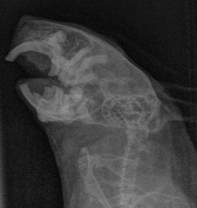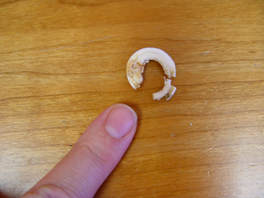 Degu with severe dental disease and developing odontoma
Degu with severe dental disease and developing odontoma
Odontomas
Kristin Claricoates, DVM
Odontomas are considered hamartomas in that they are composed of normal tissue arranged in an abnormal fashion. They occur in young animals during development of the permanent teeth. The exception to this is the rat, in which odontomas may occur at any age. Odontomas are most commonly seen in prairie dogs, and they are a benign lesion from dental epithelial and mesenchymal cells that are more like a malformation than a true neoplasm. They typically don’t develop further after they become fully calcified and are characterized by slow growth and a non-aggressive nature. The reason that odontomas are most commonly see in prairie dogs is because the root of the incisors (the front teeth) enlarge to the point that the nasal passages become blocked when an odontoma forms on the tooth. So, the odontoma itself is a major problem, but the fact that it reduces the ability for the prairie dog to breathe is the biggest concern. It is not yet known why prairie dogs tend to develop odontomas, but it is suspected that odontogenic tumors are hamartomous growths that are developing in reaction to mechanical trauma of the upper incisors. Other causes such as a vitamin or mineral imbalance, inadequate wear of the teeth, or lack of sunlight cannot be eliminated at this time. Prevention or elimination of chronic upper incisor trauma is an important first step in the management of this condition.
What would a prairie dog with an odontoma act like?
A prairie dog with an odontoma may act similar to a prairie dog with a respiratory infection. Some signs would be difficulty breathing, loud or labored breathing, open mouthed breathing, and occasional nasal discharge.
What do I do if I suspect my prairie dog has an odontoma?
If you are concerned that your prairie dog may have an odontoma, please come for a veterinary visit. On oral exam we can sometimes see signs of an odontoma. However, we can determine if your prairie dog has an odontoma through some simple diagnostic tests, such as radiographs of the head and chest to determine if there is a respiratory infection or if there is an odontoma.
If my pet does have an odontoma, what do we do now?
Unfortunately, treating a prairie dog with medicine alone does not seem to work; surgery is the only successful way to manage an odontoma. Some surgeons reported that a tracheotomy was helpful for their patients. However, it was also noted that a tracheotomy (or creating an opening in the trachea) was difficult to maintain. Instead, we recommend an attempt to extract the incisor. Because the incisor is so curved and altered by the odontoma, sometimes this incisor is difficult to extract and may fracture. If this occurs, we will surgically open up the nasal passage and place a hard plastic catheter through a hole made in the nasal passage that is past the tumor so that the respiratory distress can be eliminated. This will be a permanent change in order for your prairie dog to survive.

